Finding Yuval
...and the courage to make Adas Polo
There’s a recipe that my Persian grandmother, my Bibi, used to make on special occasions called Adas Polo. It’s a layered rice dish with lentils, caramelized onions, raisins, and braised lamb or chicken. I’ve actually never made it. I am afraid of such complicated rice dishes, so I stick to my basic koresh with chickpeas (Koresh Gheymeh), and my basic Perisan rice with potato crust (we make tadhig with potato crust at the bottom, not a layer of rice with yogurt because Jews tend not to mix milk and meat), or my favorite stew, ghormeh sabzi. At this point in my life, I have the things I know how to make pretty well and I am happy with my Persian repertoire. So it has been sort of this threesome of dishes…maybe some cutlet (a Persian fried seasoned ground beef patty), or kookoo sabzi (an herb and egg fritter), but that’s about it. And then I went to Israel and met Yuval and he made us Adas Polo. And then everything changed.
Yuval is my first cousin. I met him once when I was five years old. And then we didn’t see each other again for nearly fifty years. Here is the story of why.
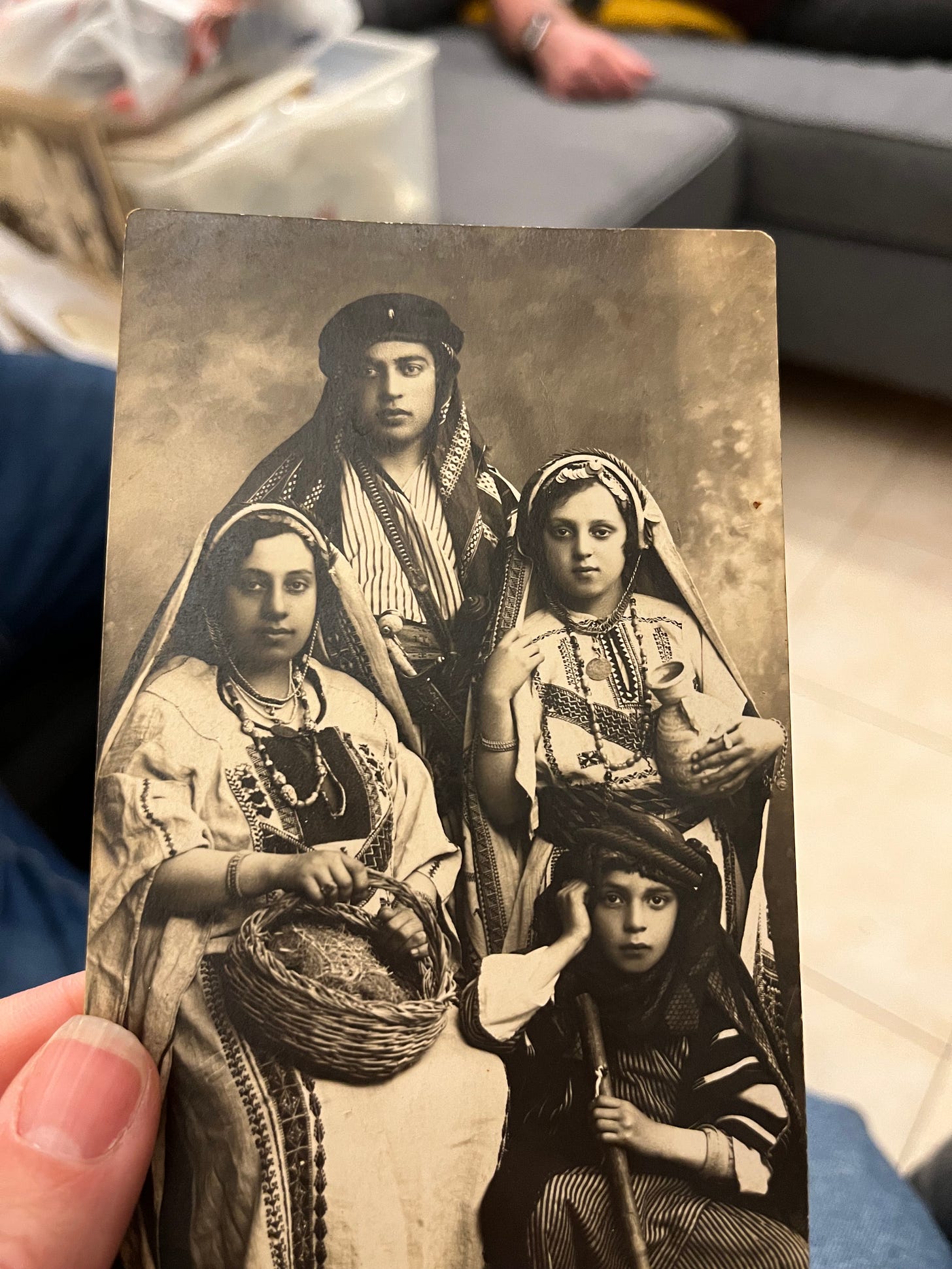
I’ll start at the beginning, which in this case could be the 1800s in the small village of Mashhad in Persia when my grandfather Issac Kassabian grew up as a boy. In 1830, the Jews in Mashhad were given a famous choice: convert to Islam or die. After 40 families were executed, the rest decided they would pretend to convert in name only, so that they could continue to live. His family “converted,” and publicly changed their name to Djemshidoff, and were not exterminated.
The beginning could also be when Isaac married his first wife, had two children, and shortly thereafter buried his young wife (cancer), and then his little daughter too. He and his teenage son Morris survived, and it was clear that Isaac would need a new wife and fast. And so a girl of 15 was chosen for him, a girl named Sarah, who happened to also be his niece (she had to be married off early so that she would not be paired off with a Muslim man and be forced to truly renounce her faith). This girl Sarah would become my grandmother, my Bibi. She would one day tell me this story and admit without hesitation that she was not at all interested in marrying her uncle at 15, but sometimes you have to do things you don’t want to do anyway. She probably told me this story when I was complaining about going to school or how I had too much homework to do, or something like that.
As it turned out, Sarah fell in love with Isaac after they married. They moved away from Mashhad and settled in London where the surviving boy, Morris, a teenager just a few years younger than his new mother, was sent away to boarding school. Sadly, it became clear Isaac was focused on a new family. This was perhaps not well received by Morris who had just lost a mother and a sister and now apparently also his father. But this is how it went.
With Morris tucked away at school, Sarah and Isaac had three kids of their own: Gloria (my mom), her brother Ron and her sister Janet. After the war ended in 1945, they all piled on a ship to America, to a little place called Kew Gardens in Queens where many Mashhadi Jewish immigrants from London found comfort in Tudor style homes and English gardens.
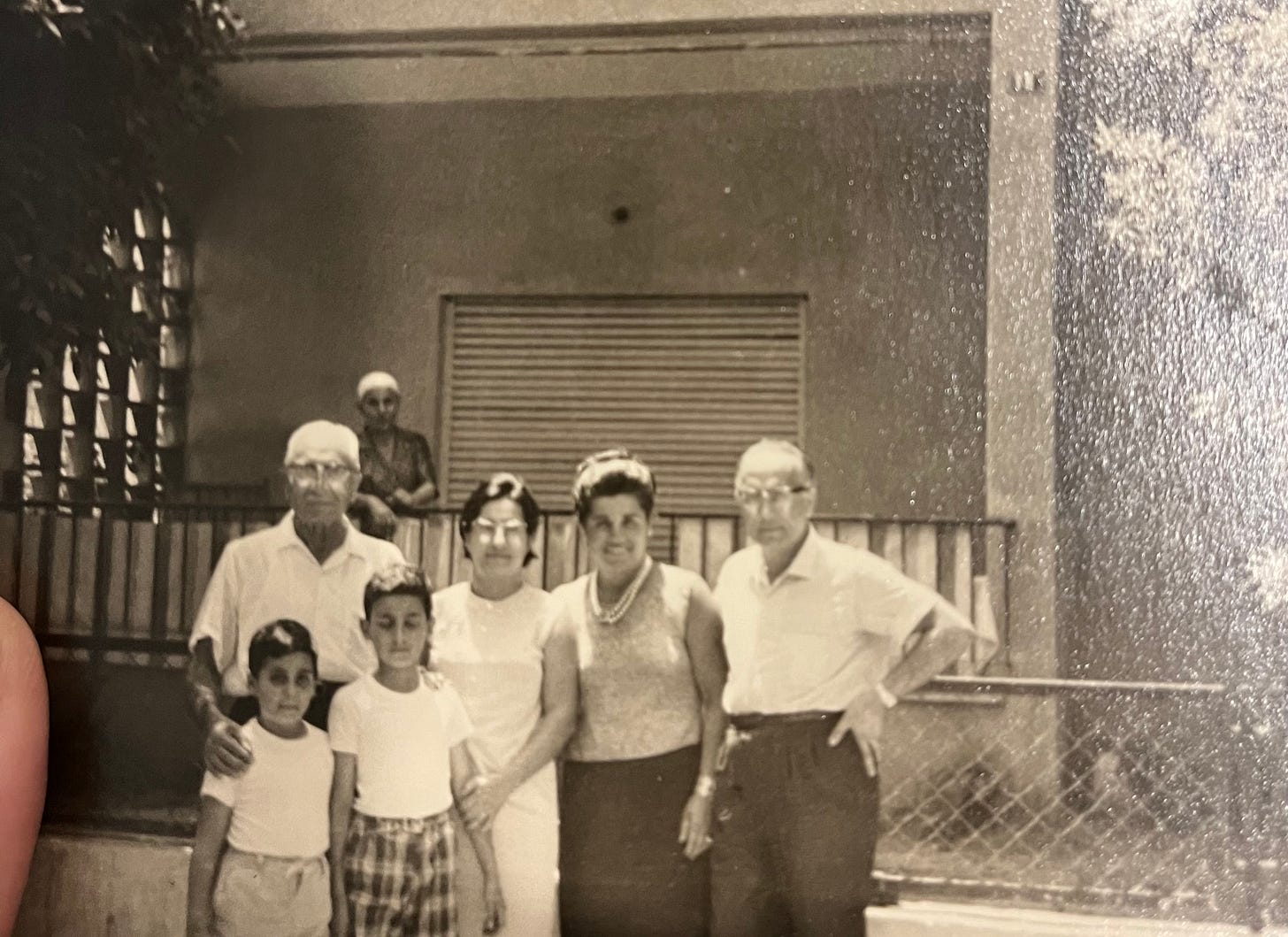
My mom Gloria grew up on Abingdon Road, playing in the street, trying to fit in at PS 99 in a country where she looked different, spoke differently, and ate differently. In the closed door rooms of their home she heard rumblings of her brother, Morris, who grew up to have his own family with a wife named Shoshana and two boys: Doron and Yuval. Letters were written. Long distance phone calls were made. The families visited each other. Morris wanted to know his siblings and their kids. He was jovial and funny. My mom and her siblings wanted to know him and his kids. They all wanted connection, not distance. The tensions thawed. And then Morris died. Young like his mother from colon cancer.
After his death, Yuval visited us in Queens to see his grandfather and his siblings. Here is a photo of all of us when he visited. I was about five years old. That was the only time I had ever met Yuval and I have no memory of it. Occasionally I would hear news about Yuval from my mom and a little flicker of a memory would turn on in my mind but really life went on and that was that.
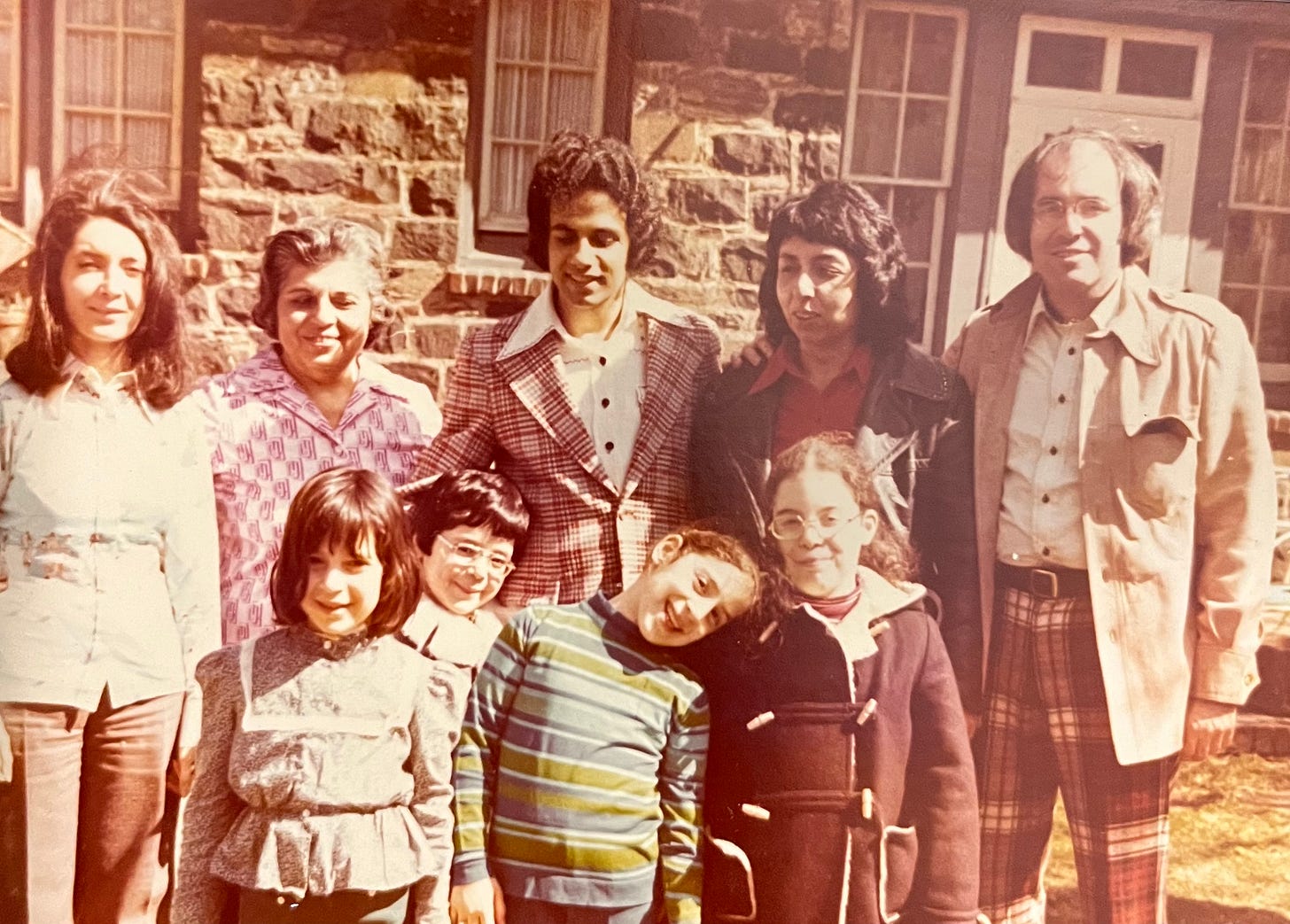
And then in 2015, a friend request came on Facebook from someone named Yuval Djemshid. I accepted. He wrote me a note:
“It is really great to be in touch… to my recollection the last time I've seen you was 40 years ago! When you were the age of your daughter.”
He told me that he was taking a break from being a lawyer and that his wife Line were running a small hotel in Jerusalem. His children had all grown up. The youngest Noam was still in the army. The eldest daughter Inbal was married, and he had two other daughters Shay-Li and Eden who were musicians.
In the years since, we kept up with each other through likes and heart emojis on Facebook posts. And then a few months ago, we decided we would take the kids to Israel. I sent Yuval a note on Messenger. “Yuval, I am finally coming to Israel! Can you recommend a place to stay?”
Of course he did. He asked us to stay with him. He said he had a small two bedroom apartment in Tel Aviv near the beach and we would be welcome. We spoke on the phone about the arrangements, and I thought, okay, why not? Granted I had not seen this person since I was five years old and I didn’t know him at all. By all accounts he was a stranger. But it didn’t really feel that crazy. So we planned on staying with Yuval.
When we arrived at the airport Yuval’s brother Doron fetched us. You might think it odd to meet someone you’ve never met, and look at them and see your own face coming in around the edges, the face of your grandfather blurred behind the lines. We hugged, we began chatting, and despite a language gap, and the fact that we had never met as adults, it was as though we had always known each other. Easy. Let’s get the bags in the trunk. Here, we can move them this way, let’s try it that way..until we figured a way to get them to fit, and the hood closed with a gratifying click.
We drove to Tel Aviv and gabbed. The kids fell asleep. We got to Yuval’s and walked into his place, and I knew the moment I saw him he was made from the same stuff. He looked like my Bibi: round face, little nose, sweet smile, and the voice, with that Farsi accent that was tinted with Hebrew. It was a voice that was familiar even though I had never heard it before. But he also moved like her, the same body language, the same warmth. We laughed and found we also had the same humor and way of being— sarcastic, dry, and deadpan but with plenty of warmth and love.
On that first Friday night, Doron, Craig and I went for a walk on the beach and watched the sunset while the kids stayed home with Yuval to help him cook. We came back to a house that smelled like Bibi’s. It stopped me in my tracks. There are smells that physically move you, right? Whether it’s the summertime smells of calamine lotion, or the way I remember being feverish as a child when I smell the sweet powdery cloy of St. Joseph’s Baby Aspirin, or the foods that have been lost to generations past, that live in your mind and in your memories, tucked inside your soul under layers and layers of life, like some emotional matryoshka doll.
I walked into the house and I was back in Kew Gardens, and Bibi was there, her small powerful little shrinking grandma self in the kitchen, cigarette dangling, moo moo flowing like Beyonce’s gown, silver hair combed back, brown skin lined and lovely, pots the size of oil barrels steaming and bubbling on the gas stove under cotton dishcloths and bent crooked lids.
And here I was in Tel Aviv, walking into Yuval’s apartment near the sea, and there he was in the kitchen like Bibi, stove covered in pots, oven full of Persian dishes that smelled like home: turmeric, onions, raisins, cumin, lentils, chicken, cinnamon, saffron and the Masshadi potato crust. There was a flaky pastry filled with ground beef and sprinkled with sesame seeds, a crunchy raw salad made of cabbage and lemon and olive oil. Yuval moved around the kitchen effortlessly; he learned to cook as an adult when he said to his mom: please teach me a few things. The lessons grew more and more complex as she taught him dishes that Sonya her mother taught her, recipes that have now been passed through generations over more than a century.
Over dinner on our last night, we met his kids and grandkids who were so lovely. We said kiddush. We sat around and caught up like people kept apart who’ve longed for each other. Finding Yuval was more than just finding a cousin. It was finding a piece of home. It felt almost like a relief to find him, like getting under a warm blanket on a cold damp night, or feeling the sunshine on your face after a cloud has darkened the day. It’s not just that you’re happy that you’ve met this person, but that you realize there was a lack, or a deficit, a space was there before, that is somehow now full.
I lost something of my world when my aunt Janet died in a fire, and then Bibi died right before my first child was born. With Yuval a sense of that family experience, the big dinners, the joy around the table, the impossible excesses of rice, all that was coming back. But also something perhaps more profound. As a child, I didn’t have the most kind father. He could be quite mean and scary, and his mood would alternate rather quickly, from kind and loving to the complete opposite. We didn't have the easiest relationship growing up or into adulthood to be frank.
Being with Yuval, watching him with my kids, and with his own children and grandchildren, I had a peek into what it might have been like to have a father who was sweet and loving. Who was warm all the time, and steady and supportive. Now of course there is no reality like the one we construct for ourselves, those could have-beens are just a house of cards, our own scaffolded wishes and dreams, but still. I wish we had found each other earlier. There are places even in my not so distant past where I know it would have been so comforting to be able to just sit with Yuval and hear him tell me, in his rich dark voice accented in Farsi and Hebrew and distant British past: “Andrea, it will be okay.”
Coincidentally, he and his partner Orly came to New York the week after we left Israel, a trip he had been planning for a while that he was inspired to book when we made the plans to come to Israel. He came over to my house a few times, and I cooked dinner. I didn't dare make Persian food. I was embarrassed. So one time we ordered pizza from our local favorite, and another night I made a go-to dinner (Sam had a basketball game right before so it needed to be quick): salmon marinated in miso, some broccoli. sticky rice.
Earlier that day Eiji and I made dumplings from scratch filled with vegetables and pinched into little half moons with accordion pleats. So we had those too. And for dessert, Sam, Eiji and I had made hamantaschen, rolling out the dough, and cutting it into circles with the bottom of a plastic cup we got at the Stranger Things experience (the perfect size!), and filling some of them with jams, some with lemon curd, and others with chocolate and peanut butter. We pinched the corners into Haman’s hat, praying they would stay closed in the heat of the oven and not turn into pancakes. We got about 20% pancakes to 80% cookies which was a victory. All tasted great; indeed shape does not matter.
We sat around the table eating, talking, and telling jokes. Some very good jokes. There was tea with the hamentashen, and we took out some old photos and admired the beauty of our youth looking back at us. We shared stories of years gone by; of when my mother went to Israel as a teenager to visit Morris and family, and spent hours chopping cucumbers and tomatoes for Israeli salad only to reach for the salt shaker, which was not secure, and pour the entire contents of the salt shaker into the salad, and promptly burst into tears. My kids got a kick out of that one, my mom too, in remembering it.
After dinner, Yuval took my kids across the street for ice cream (of course let’s get ice cream he said!), and when Sam opened our apartment door to come back inside, it slipped, and Yuval’s ice cream wound up on his coat. Yuval just laughed. It was clear Sam was anticipating something else, but no. Yuval just laughed. “Okay this is my coat’s lucky day!” he said, hugging Sam close and kissing him. “It’s okay, it’s okay, it’s okay,” he kept saying over Sam’s apologies. Sam didn't let him go.
Yesterday, on Sunday, the day when we had our weekly family dinner with Craig, I wanted to make Adas Polo. I had not been able to stop thinking about it since we returned from Israel (we ate some seriously amazing food in Israel but that Adas Polo was the best). The kids and I called Yuval to get some last minute tips and encouragement, and we shared news of the week. Eiji got into high school, his first choice! Sam made it to the basketball semi-finals and lost by two points. We went to an Escape Room and made it out in the final minute. Yuval told us a great joke. We told him how much we missed him. He said he missed us so much, too.
Then I started to cook. First, I got the chicken in the oven, rubbed with olive oil and some turmeric, cinnamon, cumin, and salt and pepper. I sliced an onion and smashed some cloves of garlic and tossed those into the roasting pan too, and put some foil on top. Then the onions. Three of them, sliced up thinly, and into the saute pan with some vegetable oil, slowly sweating and going limp and glossy then coloring slowly from white, to caramel, to dark and sweet and tangled.
Then the lentils, cooked simply in water with salt. The rice I made as I usually do, in a pot of very salty rapidly boiling water for about 6-8 minutes until al dente, drained in a colander. Then the crust. Oil and salt in the bottom of a big pot, in my case a Le Creuset Dutch Oven, with the flame on very high, crisping the potatoes. Yuval’s tip is to flip the potatoes, so both sides get a crust. Love that detail.
Then we are ready to layer: a few heaping spoons of the rice to the pot followed by a layer of chicken— taken off the bone and torn into pieces. Sam helped me with this part, doing a good job of remembering the order Yuval showed him in Israel and the spices to add along the way. “Now add the rice mom. Now the lentils, and sprinkle on some cinnamon, cumin and turmeric. Now more rice mom. Oh mom. We might need a bigger pot. Looks good mom. Not as good as Yuval’s, but good! Now the onions. More rice and raisins on top. Mom, where’s the chicken juice? Pour that over the top. Get a towel and the lid. Ok, good now let it sit on a low flame for about 15 minutes.”
When it’s ready to plate, spoon all the ingredients out together so all the different elements of the dish get mixed up. The crust comes out last — fried circles of salty crisped potatoes thatI try to scrape out whole, that will get picked off the top of the rice pile fairly quickly. These bottom dwellers, so dark and delicious, are the gold. They get all the love from everything in the pot. And then you get to eat them. You get all the love.
Adas Polo, adapted from Yuval Djemshid
Serve 6
1 chicken, cut up
Olive oil for roasting the chicken
1 teaspoon ground cinnamon, plus a little more for the rice
1 teaspoon ground turmeric, plus a little more for the rice
1 teaspoon ground cumin, plus a little more for the rice
1 ½ teaspoons salt
¼ teaspoon fresh ground black pepper
3 onions, peeled and thinly sliced
5 cloves garlic, peeled and smashed
1 ½ cups lentils
2 tablespoons neutral oil
3 cups long grain basmati rice, rinsed five times
1 baking potato sliced into circles, not too thin, about ¼ inch thick
Oil for cooking the potatoes
1 cup raisins
Directions
First, roast the chicken. Rub it with some olive oil, and the turmeric, cinnamon, cumin, salt and pepper. Place it in a roasting pan with one of the onions and a couple of the garlic cloves. Cover with foil and cook at 350 F for 1.5 to 2 hours until done. Set aside. (Don’t discard the pan juices!)
Cook the lentils according to package directions, but one or two minutes less so they are a bit al dente. Drain and set aside.
In a saute pan, caramelize the remaining two onions in about 2 tablespoons of oil. Set aside.
Make the rice. Bring a big pot of very salty water (I add at least a quarter cup of salt; it is the only seasoning your rice gets and this is how you get it to taste good) to a rapid boil. Add the rice gently to the pot and let it cook for about 6-8 minutes, checking after 6 minutes by taking a spoonful of rice out of the pot and tasting it; the should be tender on the outside with a little stiffness at the center, al dente. Once you get there, drain the rice in a colander and rinse it with some lukewarm water. Set aside.
Now pour some more neutral oil in the bottom of a nonstick pot or dutch oven. The oil should cover the bottom completely. Don’t be stingy. Sprinkle some salt on top of the oil and then place the sliced potatoes in the bottom of the pan and turn the heat up high. Let the potatoes fry, undisturbed, until they are golden brown, then flip them and let them crisp up on the other side.
Once you see they are turning golden, lower the flame to low and start layering: first some rice, followed by chicken (I like to take it off the bone and tear it into little pieces), then some more rice, then lentils and a sprinkle of turmeric, cumin, and cinnamon, then more rice, then the onions, and more rice and finally the raisins. Pour the leftover pan juices from the chicken over the top. Cover it with a dish towel and then the lid of the pot and let it steam for about 15 minutes. Then take the pot off the stove and put it on a counter for about 5 minutes without uncovering it. This helps get the crust out.
To plate, use the largest platter you have and spoon out the rice with all the goodies mixed up, and top it all with potato crust. Try to keep the pieces of potato crust whole by using a spatula to get them off the bottom. If you’ve used enough oil they should pop off. If not, no matter, they’re delicious anyway and your guests may actually fight over who gets the last one.
Now, gather many people you love around your table, and eat.


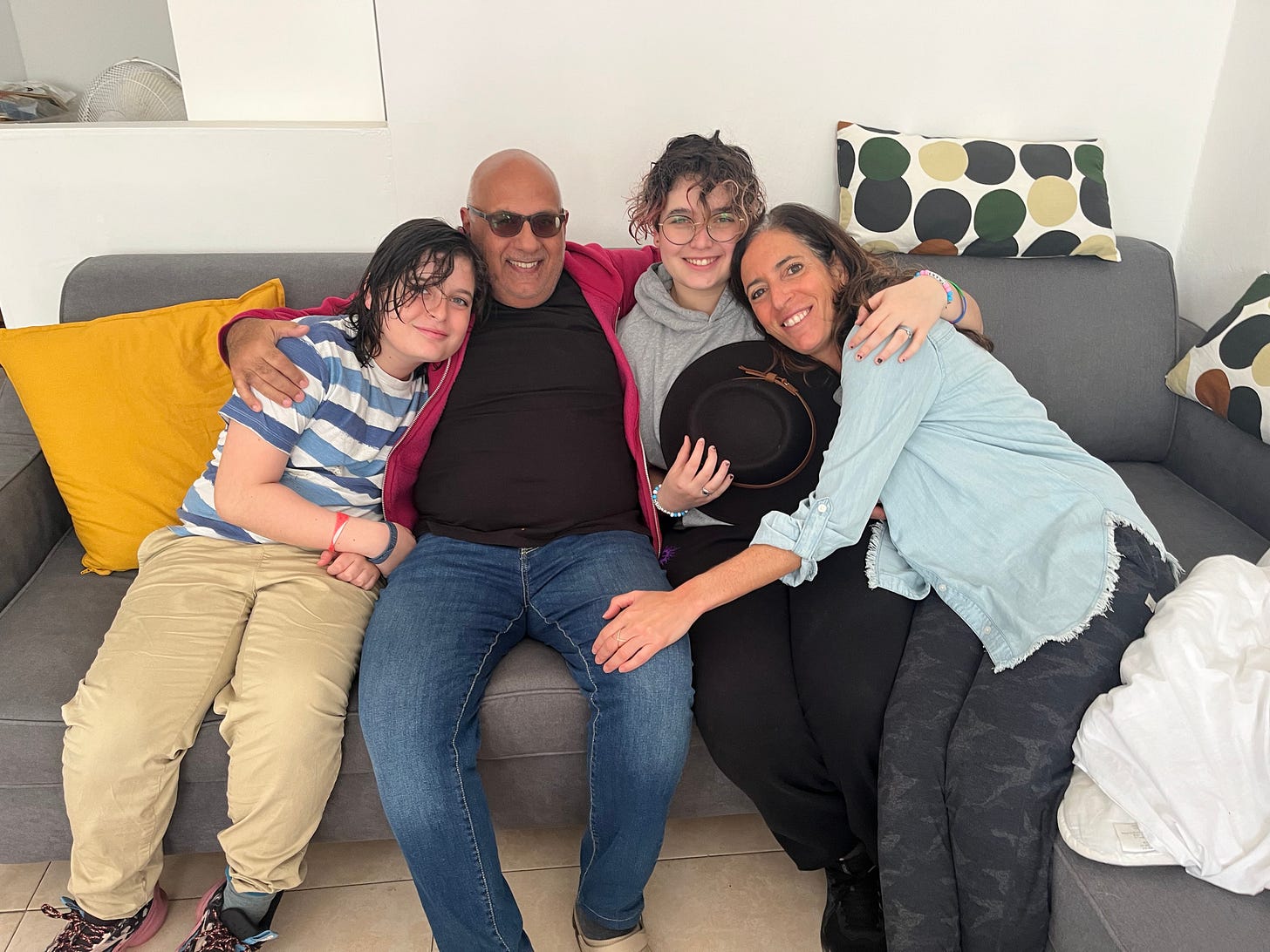

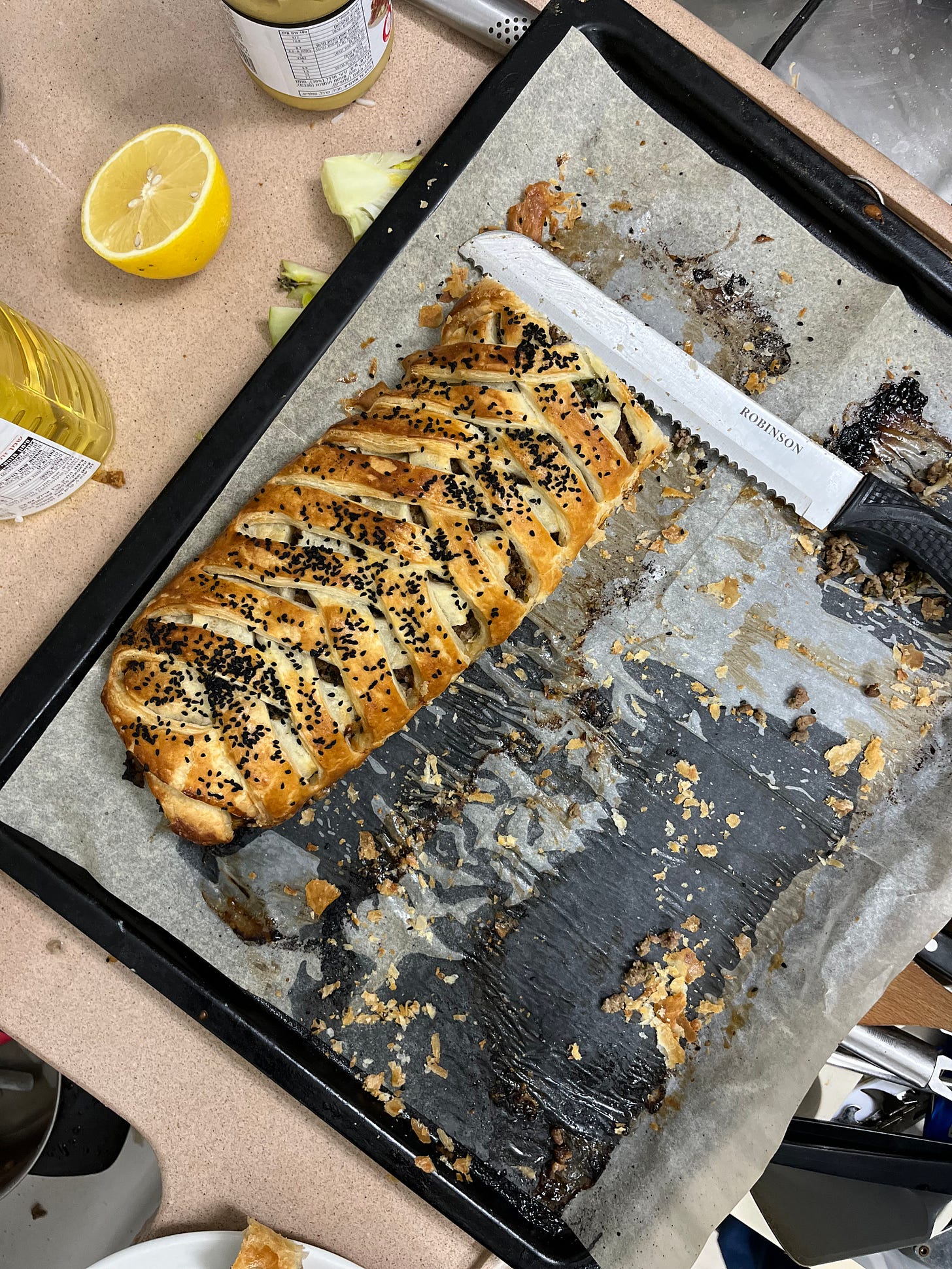
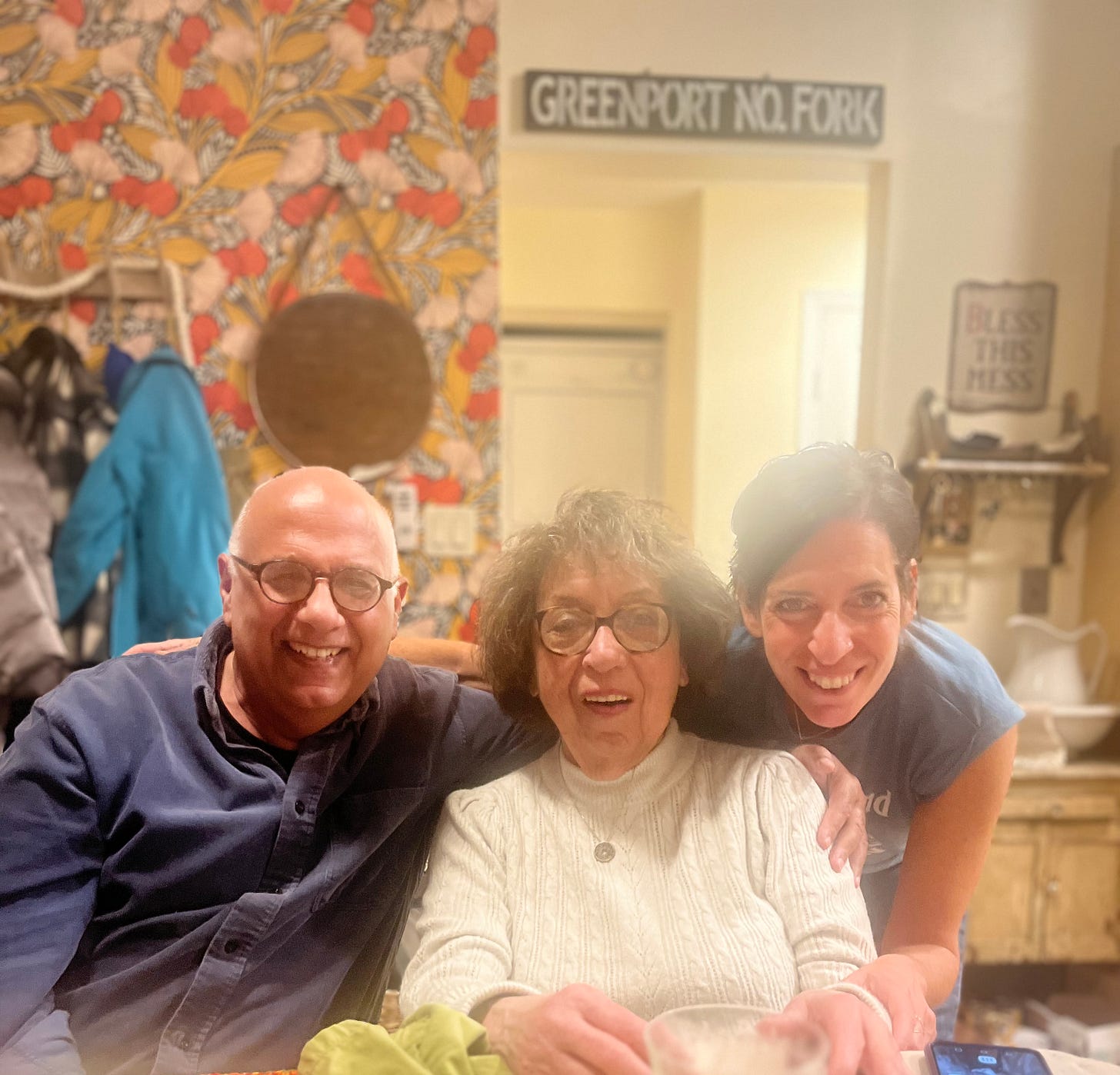
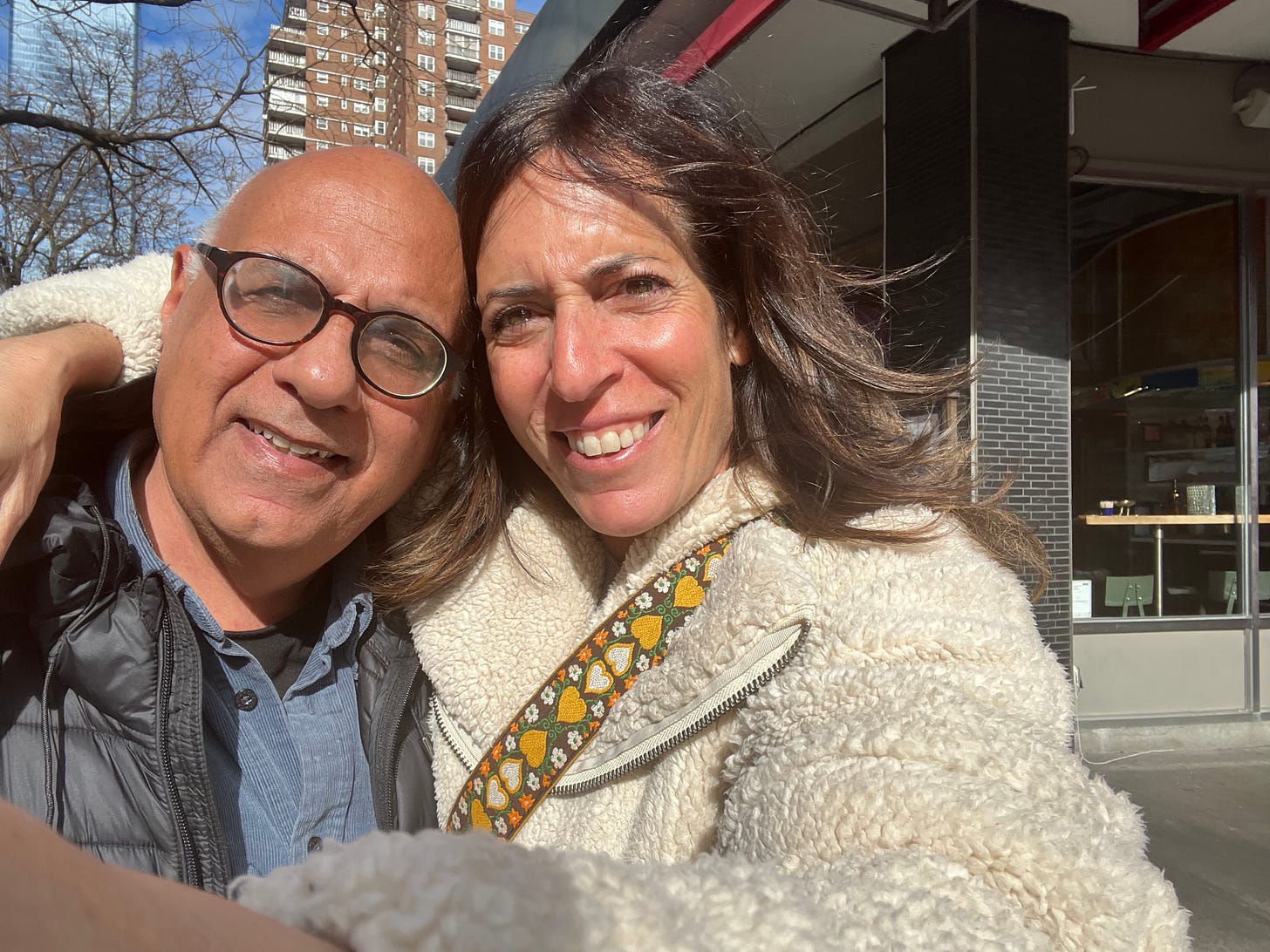

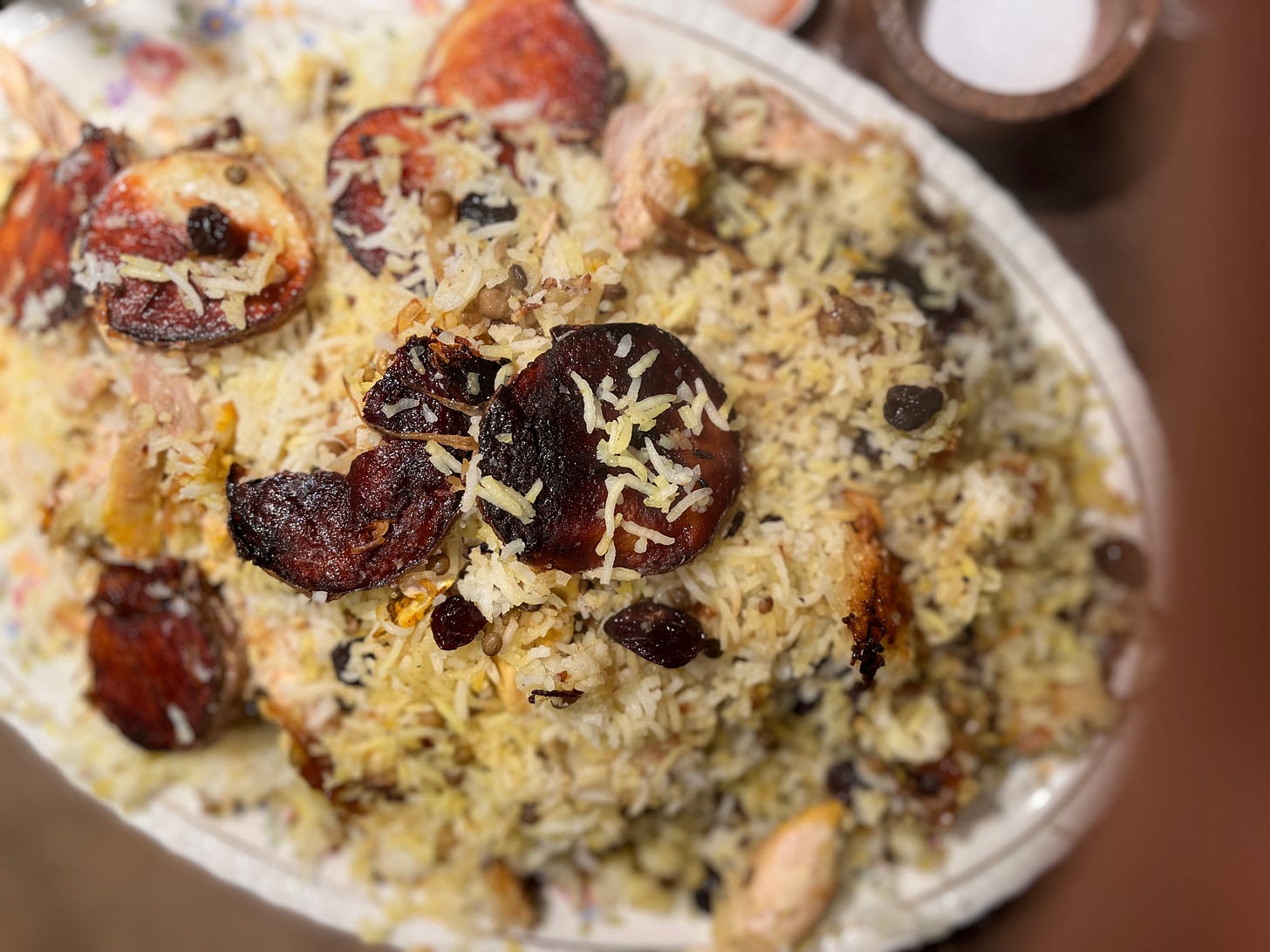
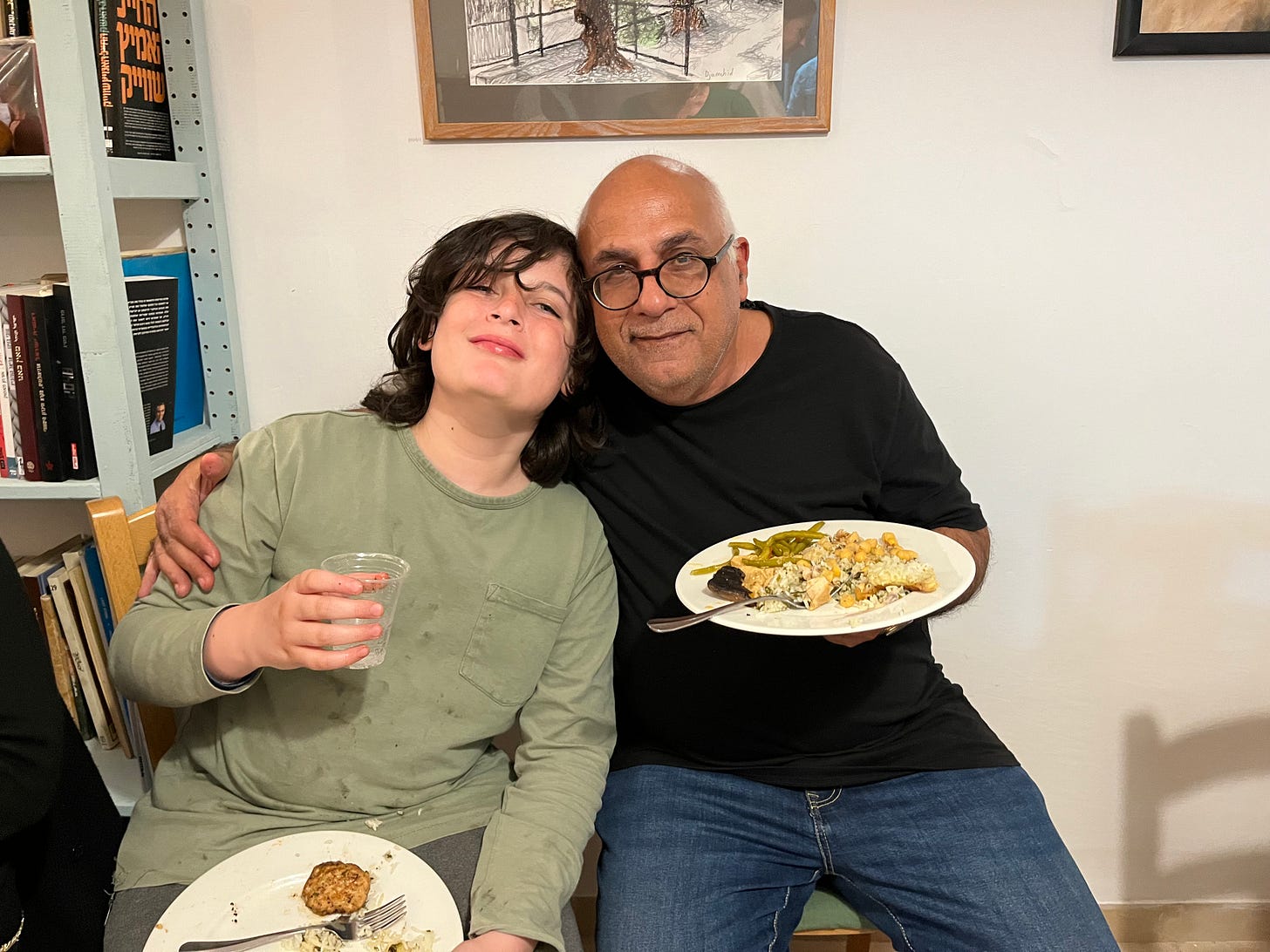
I don't remember needing to cry and eat at the same time. Thank you.
Beautiful!